Digital transformation is the way forward for agriculture
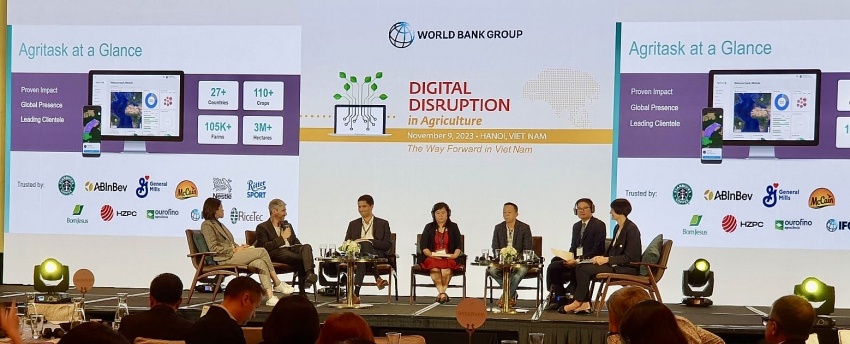 |
The forum aimed to find solutions to unlock the vast potential of digitalisation for the country's farmers, as Vietnam's agricultural landscape is on the brink of a digital revolution.
Organised jointly by the World Bank and the International Finance Corporation (IFC), in partnership with the Ministry of Agriculture and Rural Development, the forum provided a platform for experts to discuss sustainable and practical solutions. These solutions included digitising supply chains to improve traceability, enabling certification, and making crops more appealing to multinational food manufacturers and foreign markets. Additionally, key players shared their experience and insight on decarbonising agricultural supply chains, the potential of AI in agriculture, and the challenges of digitising Vietnam's smallholder-dominated supply chains.
About 200 participants at the forum had the opportunity to hear from regional and global leaders in digital agricultural technologies and connect with global technology companies and potential clients.
“Vietnam's agriculture sector is at a critical juncture. It has a bright future both domestically and internationally, but success hinges on the ability to remain competitive, with high-quality, traceable, and sustainable produce delivered through an efficient supply chain. It will also require the sector to transform to a low-carbon path as agriculture is the second-largest emitter of greenhouse gasses in Vietnam,” said Thomas Jacobs, IFC country manager for Vietnam, Cambodia and Laos.
“Reducing emissions and improving efficiency and sustainability will help realise the government’s commitment to reach net-zero emissions by 2050, halt biodiversity loss, and provide sustainable livelihoods. The government has also laid out specific targets to reduce methane emissions from rice production and to ensure no coffee is produced in deforested areas,” Jacobs said.
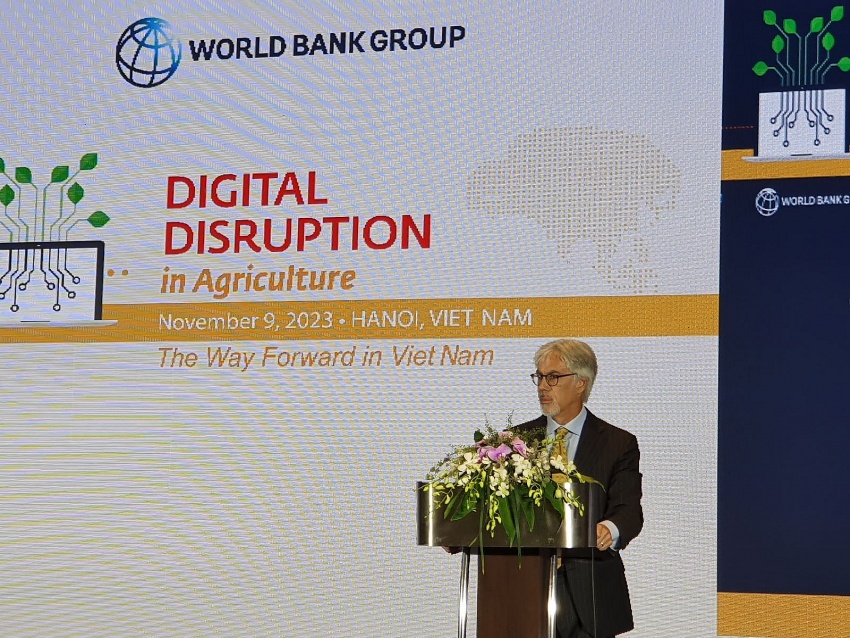 |
| Thomas Jacobs, IFC country manager for Vietnam, Cambodia and Laos |
Achieving these goals will require collective action by the government, farmers, agricultural commodity firms, and other key players in the sector. Digital technologies will be key, as will innovation and investment from the private sector.
In a country where agriculture remains a strategic pillar of the economy, the rapid development of digital technologies offers a unique opportunity to enhance productivity, improve sustainability, and diversify the livelihoods of farmers. The use of digital tools and technologies promises to enhance the traceability and sustainability of Vietnam's major crops, including rice, pepper, and coffee. These improvements are critical to maintaining economic growth and protecting market opportunities for local food producers. The agricultural sector accounts for approximately 12 per cent of Vietnam's GDP and a significant portion of the country's employment.
“We stand ready to help our partners align with the climate change goals agreed at the 2015 Paris Climate Accord and to support them with their emissions' reduction planning,” added Jacobs.
The World Bank and IFC have been actively involved in the Vietnamese agricultural sector, working diligently to identify and promote digital products and services that can catalyse digital transformation in agriculture. The institutions are dedicated to leveraging disruptive technologies to enhance food security and market opportunities for Vietnamese small-hold farmers and agri-food companies.
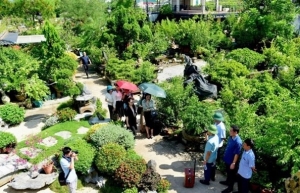 | Hanoi moves to tap riverside agri-tourism potential With its great potential for ecological agriculture and tourism, especially in riverbank areas, Hanoi has paid attention to developing riverside agri-tourism models. |
 | Vinimex nurtures dream of 'seamlessly' agriculture Tran Vu Quynh Nhu, CEO of Vinimex Group and recipient of the Corporate Excellence Award at the Asia Pacific Enterprise Awards (APEA) 2023, shares her dream of building Vinimex’s mission in ‘seamless’ agriculture. |
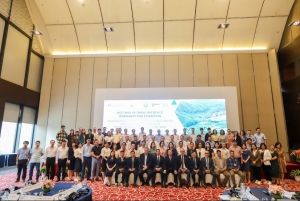 | 150 participants join seminar about circular agriculture On November 1, the Ministry of Agriculture and Rural Development in collaboration with several parties organised a seminar themed "Platform for the best available environment practice in livestock commercial farms for circular agriculture." |
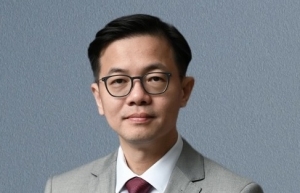 | USSEC contributes to upgrading Vietnam’s agricultural sector In mid-September, the US Soybean Export Council (USSEC) in Vietnam organised the SE Asia US Agricultural Cooperators Conference 2023, showing the commitment and partnership that US growers have for the Vietnamese market and Southeast Asia. VIR’s Kim Oanh spoke with Timothy Loh, regional director, SE Asia and Oceania, US Soybean Export Council about the highlights of the conference. |
What the stars mean:
★ Poor ★ ★ Promising ★★★ Good ★★★★ Very good ★★★★★ Exceptional
Related Contents
Latest News
More News
- Masan Consumer names new deputy CEO to drive foods and beverages growth (February 23, 2026 | 20:52)
- Myriad risks ahead, but ones Vietnam can confront (February 20, 2026 | 15:02)
- Vietnam making the leap into AI and semiconductors (February 20, 2026 | 09:37)
- Funding must be activated for semiconductor success (February 20, 2026 | 09:20)
- Resilience as new benchmark for smarter infrastructure (February 19, 2026 | 20:35)
- A golden time to shine within ASEAN (February 19, 2026 | 20:22)
- Vietnam’s pivotal year for advancing sustainability (February 19, 2026 | 08:44)
- Strengthening the core role of industry and trade (February 19, 2026 | 08:35)
- Future orientations for healthcare improvements (February 19, 2026 | 08:29)
- Infrastructure orientations suitable for a new chapter (February 19, 2026 | 08:15)

 Tag:
Tag:

















 Mobile Version
Mobile Version